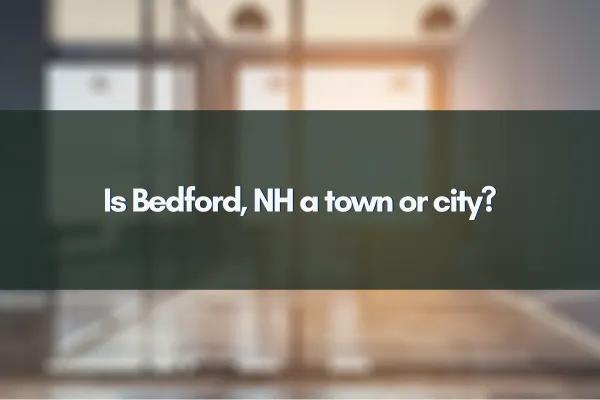
Is Bedford, NH a town or city?
Is Bedford, NH a Town or City?
When you hear “Bedford, NH,” what pops into your mind? Quaint New England charm? Lush suburbs? A community where tradition meets modern living? But hidden behind all that charm lies a simple but surprisingly common question: Is Bedford, NH a town or city?
Let’s dive into this question with the curiosity of a Steve Jobs product reveal and the SEO savvy of Neil Patel. We’ll explore history, governance, population data, and more — all in a way that keeps you hooked. Ready? Let’s go.
1. The Straight Answer: Bedford, NH Is a Town
You might be wondering why this distinction matters. After all, aren’t towns and cities just… places people live? Well, it turns out that whether a place is officially designated a town or city impacts local governance, services, and sometimes even the vibe of the community.
Bedford, New Hampshire is officially a town.
Yep, despite being home to approximately 22,000 residents (which some might consider city-size in other states), Bedford retains its town status. This classification is codified by the State of New Hampshire and reflected in all official documents — including those found on Bedford's official website.
2. What Defines a Town vs. a City in New Hampshire?
Understanding Bedford’s designation requires a quick NH civics lesson.
In New Hampshire, “town” and “city” are official legal terms.
Towns operate under a traditional “town meeting” form of government or have a town council.
Cities generally have a mayor-council or city manager system.
Bedford operates with a town manager and an elected Select Board—typical town governance. They host regular town meetings and elections that engage residents in decision-making.
3. Why Does Bedford’s Town Status Matter?
Beyond trivia, the town designation affects specific facets:
Community participation: Bedford’s town meetings allow direct resident involvement, a hallmark of New England tradition.
Governance style: A Select Board reflects a more “grassroots” local leadership than a city mayor.
Civic identity: Towns often embrace a closer-knit feel, despite population size nearing some small cities.
For context, Bedford’s population hovers around 22,000 residents, making it one of the larger towns in New Hampshire—but still proudly operates as a town.
4. Historical Perspective: How Bedford Became a Town
Have you noticed many New England towns share a similar story? Bedford’s story is no different:
Bedford was incorporated as a town in 1750.
For nearly three centuries, it has maintained its town designation.
Changes in population or suburban growth didn’t push a reclassification.
This steadfast identity tells you something — Bedford residents and leadership value tradition and local involvement over changing “labels.”
5. The Population Factor: Big Town, Not Quite a City
Sharing a few data points:
Bedford has around 22,000 residents as of the latest estimates.
Compare this with nearby cities: Manchester, NH has over 115,000 residents.
Many “cities” in the U.S. can have fewer residents than Bedford, but New Hampshire’s system focuses on government structure, not just headcount.
In other words, population alone doesn’t flip Bedford into a city — government structure does.
6. Governance in Action: Bedford’s Select Board
Imagine the Select Board as the town’s “board of directors.” They make important decisions on budgets, town policies, and governance.
More details:
Select Board members are elected at large.
They appoint a Town Manager who runs day-to-day operations.
Town meetings provide platforms for resident voices to be heard directly.
This setup contrasts to a mayor-led city government, emphasizing direct democracy.
7. Bedford’s Government Operations Compared to Cities
What about services like utilities, police, and fire?
Bedford provides municipal services typical to towns — police, fire department, public works.
Larger cities may have more specialized departments or agencies.
Bedford works closely with Hillsborough County and the state for additional services.
8. FAQs About Bedford, NH’s Town or City Status
Q1: Can Bedford become a city in the future?
Possibly, but only if residents and government pursue a change via legislative processes, including drafting a city charter and holding public votes.
Q2: Does being a town limit growth or business?
No. Bedford thrives economically with a healthy mix of residential zones, businesses, and commercial areas.
Q3: Where can I find official details about Bedford's government?
Visit www.bedfordnh.org, the official town website.
9. Storytelling Moment: Why This Matters for Residents and Visitors
Imagine you’re moving to Bedford, NH. Knowing that Bedford is a town—not a city—means:
You’re stepping into a community that values resident participation and tradition.
You might find town meetings that welcomingly invite you to speak up.
Services are responsive, but without the complexity of a city bureaucracy.
It’s that balance: a large town feel with personal attention.
10. Final Thoughts: Bedford, NH’s Identity Shines Bright
Whether you call it a “big town” or jokingly compare it to a “small city,” Bedford holds true to its identity. It melds historic New England town governance with the dynamism of a growing, modern community.
Ready to Explore Bedford, NH or Need More Info?
If Bedford’s charm and structure intrigue you, or you want expert help navigating real estate here, reach out!
📞 Contact: Mark Lynch
📍 Title: Realtor
📲 Phone: (603) 488-6260
📧 Email: [email protected]
🌐 Website: https://remarkablerealestatenh.com
Let’s uncover Bedford’s possibilities together!
Remember: Understanding the difference between towns and cities isn’t just academic—it’s your key to engaging meaningfully with the community. Whether you’re buying a home, starting a business, or simply curious, Bedford, NH’s status as a town speaks volumes about its spirit.
Thanks for reading! Have questions? Drop a comment or share this post. Your curiosity keeps the conversation alive.
